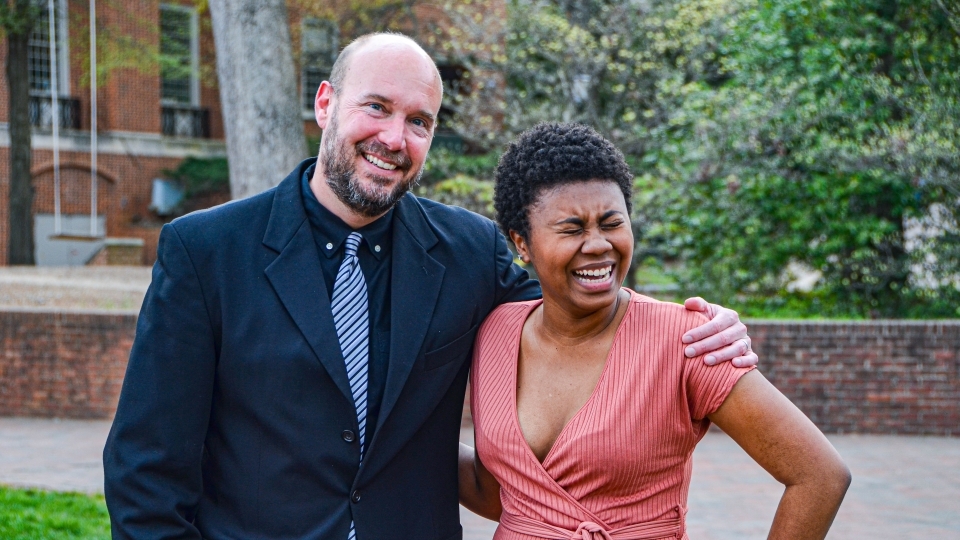Q&A led by Kaiya Carter ’19 with Author Jason Ockert
August 8, 2019
- Author
- Kaya Carter '19

Kaiya Carter ’19 and Jason Ockert, meeting in person during his visit to Davidson.
Kaiya Carter ’19, work assistant for the English Department, engaged in a “tongue-and-cheek” interview with Jason Ockert, author, at the English Department’s April 2018 Writing Award Competition.
Jason was a judge for the literary contest and also gave a reading following the awards ceremony which was open to the general public. The English Department strives to give its work assistants challenging assignments that will give them experience they can take into the work force. Kaiya’s interview with Jason presented that challenge.
Jason Ockert, Professor of English at Coastal Carolina University and author of "Wasp Box" and "Neighbors of Nothing," kindly agreed to an “eccentric email interview" in anticipation of his April 4 visit to Davidson. I read "Wasp Box," a novel, and "Neighbors of Nothing," a book of short stories. Both works bristled with epigrammatic prose. Ockert has mastered the intersection between profound, weird, sad and fun in these two works. In honor of this mastery, I sent him the weirdest questions I could think of. True to form, his responses are a delight.
Q: If a wasp read Wasp Box, what do you think it would say about it?
A: First of all, thanks for taking the time to talk with me about my writing. I sincerely appreciate it.
I learned a lot about wasps when researching this book. So, I feel as qualified as anyone to speak for them. Here’s how it might play out:
Me (M): Hey, wasp. What’s up?
Wasp (W): Nothing.
M: What do you think about "Wasp Box"?
W: It was all right.
M: Just all right?
W: You kind of demonize us. Folks already express an irrational fear of wasps. Your book doesn’t allay those fears.
M: Where did you learn a word like allay?
W: Don’t patronize. We wasps know plenty of words.
M (apologetically): Sorry. It’s just that I’m supposed to put words into your mouth.
W: In your book you put us into ears and make us feast on brains. That’s kind of gross.
M: Sometimes in order to compel a reader to dip into the psychological headspace of repressed trauma you have to use visceral imagery…
W: Do what, now?
M: …which might make the reader uncomfortable, but sometimes you have to unsettle in order to seize the attention of our ever-desensitized emotionally-numb society…
W: What are you carrying on about?
M: …borrowing from certain traditions and as Franz Kafka said, “A book must be…
W: The dude who turned his character into a cockroach?
M: …an axe for the frozen sea inside us.”
W: You’re no Kafka.
M: No. I know.
W: …
M: So.
W: So.
M: So, listen; do you think it’d be cool if I climbed on your back? Maybe we could fly around for a while?
W (exasperatedly): Fine. Hop on.
The wasp and I buzz off into the apocalyptic sunset.
Q: When I was a child, I put a tooth in my ear “to see if it would fit”; did a similarly odd experience of having something in your ear inspire wasps entering through the ear?
A: Well, that’s all kinds of weird. I hope that it was your tooth, at least.
I don’t have any memories of shoving things into my ears. The original idea for "Wasp Box" came from a memory when I was a bored, lonely child spending time at my father’s house (he and my mother were divorced and my brother and I would stay at his place every other weekend). One day, I noticed a wasp flitting around inside the house. It kept bouncing off the window screen trying to escape. I didn’t let it. I found an antique box on the fireplace mantle and managed to coax the wasp inside. Trapped, it buzzed and rattled. I returned it to the mantle and walked away.
Why did I do this? It’s hard to say for sure. I desperately wanted the world to be more interesting than it was; reality didn’t hold a candle to my active imagination. Perhaps I imagined that a Future Someone would open the box, see the dead wasp, and say, “Huh. How did that get there?” The wasp in its tomb was a little mystery and I wanted to be the creator of that mystery.
Of course, it was a cruel thing to do. Perhaps in revisiting the memory and writing it into existence I’m after a kind of absolution?
Q: Did you do any wine tasting while working on the setting of this novel? If so, do you have any recommendations? I’m about to graduate so I feel like I should up my wine game.
A: Congratulations on your impending graduation!
Yeah, I spent a decade living in the Finger Lakes region and I got to know the landscape pretty well.
Wine is bottled nostalgia. Drink good wine with good people and it will age well. Otherwise, I recommend the house merlot.
Q: Why are the "Neighbors of Nothing" stories in this order? Were they written in this order?
A: The stories were not written in order in which they appear.
In terms of arrangement, I believe it’s smart to start out with a piece that establishes the voice/tone of the collection so that the reader knows what she’s getting into.
The general theme of the book is about loss which is a pretty depressing topic. If I’m going to ask the reader to wade into such a quagmire it’s important to provide moments of comic relief and/or absurdity. I tried to be cognizant of the emotional journey the reader undergoes from the beginning of "Neighbors of Nothing" to the end.
Of course, many readers don’t read a collection sequentially. The counterbalance of heaviness/lightness also exists within each individual story.
Q: Everyone in “Jakob Loomis” has a vivid, verging on overactive imagination. Why is that?
A: Like fiction writers, convincing liars need to have an active imagination. The men in the story are all lost. It seems to me that there is a propensity for the wayward to seek direction from the blueprint of their youth: to plumb a time when once maybe something had been good. Childhood, seen as uncomplicated and innocent, often becomes the vessel in which we take emotional refuge. The place where memory and imagination overlaps is filled with dangerous possibility, as the characters in “Jakob Loomis” discover.
Q: In “Everyday Murders,” an especially captivating passage reads “An Exxon exploded. The Fish Shack fried. Crops combusted...the bog boiled creatures alive, concocting a moribund gumbo” - How do you manage to make me enjoy a description of a wildfire? How did these sentences unfold? How did you capture the urgency and near-comical futility of fighting such a fire?
A: It makes me happy that those sentences resonated with you.
I read short stories in order to be moved. In order for me to be moved, I’ve got to be surprised. Surprises can exist on the plot level, the character level, and the setting level. However, the surprises that thrill me the most are the ones that happen at the sentence level. When a short story writer turns a phrase that makes my jaw drop, pulse race, heart skip a beat, I’m hooked and will eagerly follow her to the end.
Finding the right sentence takes practice. You have to tune your ear to the best voice in your head. Reading poetry helps.
Q: Oddly specific websites play a surprisingly large role in “Everyday Murders”. In honor of that, go to theuselessweb.com. What website did you get?
A: thatsthefinger.com. There’s a hand. When you point the mouse over the pointer finger, the screen is white. When you point the mouse at the middle finger (causing the hand to flip you off), the screen turns red.
A long time ago, I had a short-short story appear in an online magazine called Born. Essentially, the site is collaboration between visual artists and writers. The graphic designer assigned to my story decided to force the viewer/reader to gut a shark in order to read the story. Pretty unsettling. If you’re interested, it’s here: bornmagazine.org/projects/shirtless.
Thanks again for this eccentric interview!
Jason Ockert is the author of Wasp Box, a novel, and two collections of short stories: "Neighbors of Nothing and Rabbit Punches." His honors include the Dzanc Short Story Collection Contest, the Atlantic Monthly Fiction Contest, and the Mary Roberts Rinehart Award, as well as inclusion in Best American Mystery Stories. He holds degrees from the University of Florida and Syracuse University; he teaches at Coastal Carolina University and in the University of Tampa’s low-residency M.F.A. program.
